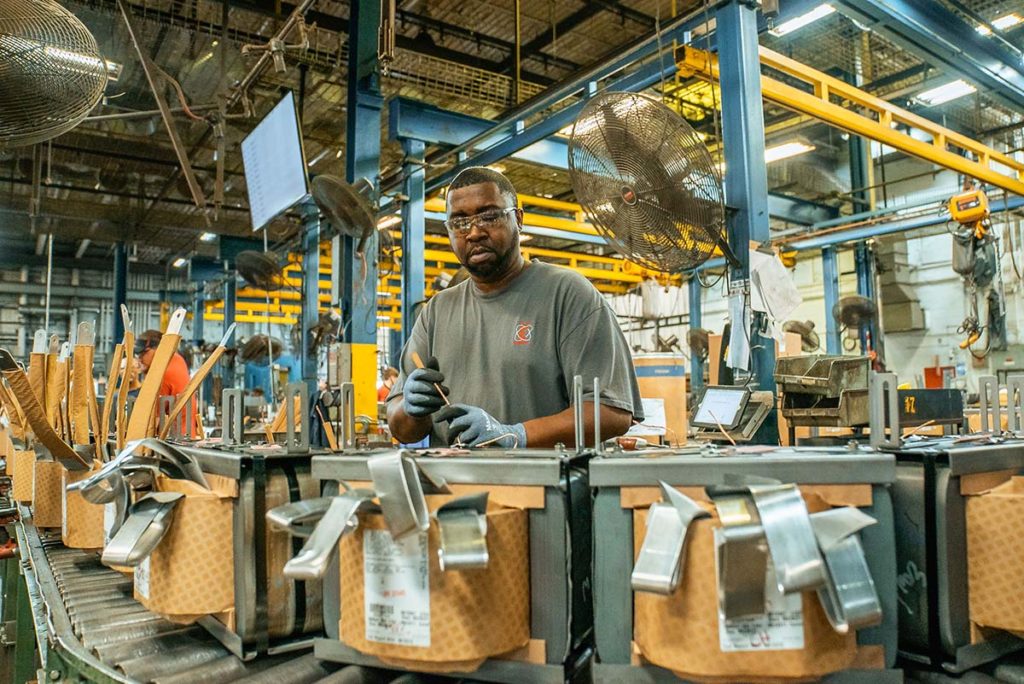
A group of electric cooperative executives is collaborating with power industry leaders and the federal government to find solutions to supply and logistics challenges that are threatening the nation’s energy needs.
The Electricity Subsector Coordinating Council’s new Tiger Team, created in June, will be chaired by a co-op representative and includes co-ops, public power providers, investor-owned utilities and key federal agencies that are working together to address current shortages and develop strategies to prevent recurrent challenges. Panel members are sharing their operational expertise, identifying alternative vendor sources for essential products and making recommendations to the government on potential solutions.
“The COVID-19 pandemic caused everything to stop or slow down for about 18 months,” said Buddy Hasten, president and CEO of Arkansas Electric Cooperative Corp. and Arkansas Electric Cooperatives Inc. and chairman of the Tiger Team. “When the world emerged from the worst of the pandemic and got back to business, there was a lot of pent-up demand in the economy.”
Stepped-up activity in residential and commercial construction, labor shortages, and increased federal and state investments in power and broadband infrastructure have contributed to scarcity of certain essential parts and materials. Electric transformers, utility poles, electrical conductor and fiber optic cable are among the products in short supply or facing shipping delays.
Many utilities were forced to deplete their warehouses and staging yards to meet construction demand or handle repairs while manufacturing was stalled.
“This has eroded the traditional reserve inventory of critical infrastructure. Given the supply chain constraints, there are long lead times making it almost impossible for utilities to restock to normal levels of inventory for storm seasons,” Hasten said.
The structure of the Tiger Team ensures that all members, regardless of customer base, revenue or the size of their service territory, will have a voice in policy discussions. It also offers opportunities to share information on emerging issues before they become major problems.
“Addressing ongoing supply chain challenges requires an understanding of the diverse impacts, exceptional collaboration and an openness to creative solutions,” said NRECA CEO Jim Matheson. “It’s great to have electric co-op leaders play a leading role on this Tiger Team, which will be key to identifying potential solutions and ensuring our government partners help take appropriate steps to address the problem.”
Ten members of the Tiger Team were selected by NRECA, the American Public Power Association and the Edison Electric Institute, the association representing investor-owned utilities. In addition to Hasten, co-op representatives are Tim Mills, president and CEO of ERMCO, a manufacturing enterprise owned and operated by Arkansas co-ops; Chris Perry, president and CEO of United Utility Supply, a logistics co-op headquartered in Louisville, Kentucky; and Bob Bisson, vice president of electric system development at Northern Virginia Electric Cooperative, a Manassas-based distribution co-op.
According to the National Association of Manufacturers, there are currently 850,000 full-time manufacturing jobs available in the United States, and a significant percentage of those openings are entry-level positions requiring only high school diplomas. NAM projects a need for 4 million new workers to fill manufacturing positions through 2030.
“An expanded labor force is the only possible near-term solution at ERMCO. Further investments in capacity for both raw materials and transformer production is the long-term solution,” said Mills.
The Tiger Team will meet weekly over the next few months to consider recommendations developed by its members to address near-term challenges and sustainable solutions to meet current and future supply needs.
“The supply chain disruptions are not the same for all manufacturers, and given the random nature of the disruptions, there can be a corresponding randomness to how each manufacturer is impacted,” said Hasten. “Having more than one option to obtain the needed supplies provides a cooperative a higher probability of getting what is needed. However, there are certain limitations to this in that there are some sectors where demand has outpaced supply across the board. These challenges are what we are trying to solve.”
Derrill Holly is a staff writer for NRECA.